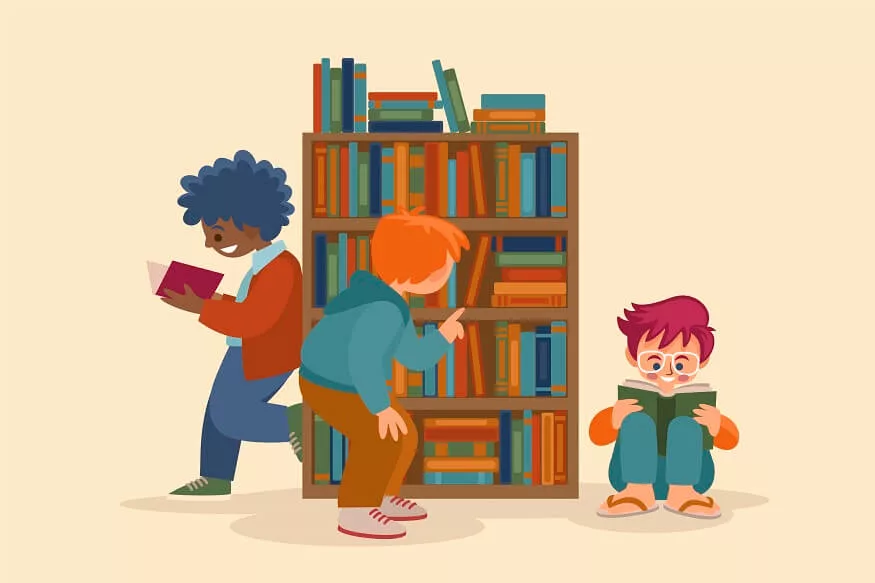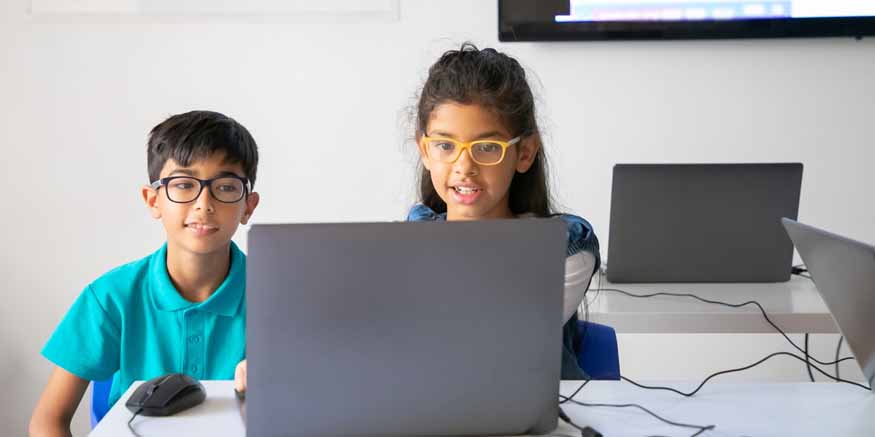To ensure that the library remains an effective space for everyone, students must adhere to a set of essential guidelines – library etiquette. This set of unwritten rules and manners plays a pivotal role in creating a conducive environment for studying and research. In this article, we will explore the significance of library etiquette for students, shedding light on its importance in fostering a respectful and efficient atmosphere for intellectual pursuits.
Schools’ Manifesto For Understanding Library Manners
Understanding library etiquette is essential for creating a harmonious and productive academic environment. In schools and institutions, library etiquette goes beyond mere rules; it encompasses a set of behaviours that reflect respect for both the physical space and the intellectual resources within it.
Firstly, maintaining a quiet atmosphere is fundamental. Conversations should be hushed, and electronic devices should be set to silent mode to avoid disruption. Schools instil this understanding through signage, regular reminders, and perhaps even orientation programs.
Secondly, the proper handling of library materials is crucial. Books and resources should be returned to their designated places, preserving the order of the collection. Many schools encourage students to develop a sense of responsibility by teaching them the Dewey Decimal System and the importance of accurate shelving.
Furthermore, respecting the time and space of fellow library users is emphasised. This involves refraining from loud activities, reserving group discussions for designated areas, and adhering to time limits on computer usage.
By instilling a deep understanding of library etiquette, schools ensure that students not only abide by rules but also internalise the principles of respect, responsibility, and consideration for others, fostering a conducive environment for academic growth and exploration.
Also Read: What Are The Playground Etiquette For Children and Parents
Library Rules For Students To Follow
Library etiquette is crucial for students as it fosters a conducive learning environment, promotes respect for resources, and enhances the overall academic experience. Cultivating proper behaviour ensures a harmonious and productive scholarly community. Here are some library etiquette that students should follow:
- Silence is Sacred
- Respect for Shared Spaces
- Care for Library Resources
- Technology Etiquette
- Time Management
- Dress Code Awareness
- No Food or Drink (or Limited Consumption)
- Mindful Conversations in Designated Areas
- Civic Responsibility
- Educate and Encourage
The cornerstone of library etiquette lies in the appreciation for silence. The library is a space where concentration is paramount, and loud conversations disrupt the tranquil atmosphere. Keeping conversations to a minimum and in hushed tones is not just a courtesy but an essential aspect of respecting the collective need for a quiet environment. Whether engaged in group discussions or individual study, maintaining a library-appropriate volume is an unwritten rule that every student should follow.
Libraries are communal spaces where students from diverse backgrounds converge to pursue knowledge. Respecting shared spaces involves maintaining cleanliness in study areas, not monopolising seating, and ensuring personal belongings do not encroach upon others’ workspaces. This mutual respect fosters an environment where every student can utilise the available resources without feeling encumbered by the actions of their peers.
Library resources are the lifeblood of academic pursuits, and treating them with care is an integral part of library etiquette. Books should be handled delicately, avoiding markings or dog-earing pages. Returning borrowed materials on time ensures that others can access them promptly. Additionally, using electronic resources responsibly, such as computers and printers, contributes to the overall well-being of these shared assets.
In an era dominated by digital devices, technology etiquette plays a crucial role in library conduct. Using headphones for audio, setting mobile phones to silent mode, and refraining from engaging in disruptive online activities contribute to a harmonious technological coexistence. By acknowledging the impact of personal technology on the library environment, students ensure that everyone can benefit from the resources available without unnecessary disturbances.
Effective time management is a key aspect of library etiquette. Limited resources, such as study rooms or computer stations, often come with designated time constraints. Adhering to these limits ensures fair access for all students. Being mindful of time not only promotes equity but also reflects a shared commitment to making the most of the available resources.
Also Read: 10 Tips for Proper Classroom Etiquette
While not universally applicable, some libraries may have specific dress code expectations. Understanding and adhering to any dress code guidelines ensures that everyone feels comfortable and respected in the shared space. This awareness reflects a consideration for the diverse community that utilises the library facilities.
Many libraries enforce a strict no food or drink policy to preserve the integrity of their resources and maintain cleanliness. Even in libraries that permit limited consumption, it is essential to be mindful of the types of food and drinks allowed and to clean up after oneself. Respecting these policies contributes to a hygienic and pleasant environment for all library users.
While silence is a golden rule, some libraries provide designated areas for group discussions or collaborative work. If engaged in such activities, students should be mindful of their volume and choose appropriate locations to avoid disturbing others. This way, the library caters to diverse study needs while maintaining an overall atmosphere of respect and consideration.
Library etiquette extends beyond personal conduct to a broader civic responsibility. Reporting any disturbances or violations of library rules to library staff ensures a collective effort in maintaining the sanctity of the space. This responsibility fosters a sense of community where students work together to create an optimal environment for intellectual pursuits.
Lastly, part of practising good library etiquette involves educating fellow students. By gently reminding peers of library rules and etiquettes, students contribute to a culture of mutual understanding and respect. Encouraging others to follow the established norms helps create a positive and supportive library community.
Also Read: 10 School Cafeteria Etiquette Every Kid Should Know
Library etiquette for students is not merely a set of rules but a shared commitment to creating an environment conducive to learning and research. Library etiquette is pivotal for students, fostering a respectful environment. It cultivates responsibility, enhancing academic experiences and creating a conducive atmosphere. EuroSchool prioritises library etiquette by implementing clear guidelines, interactive workshops, and regular awareness programs.









